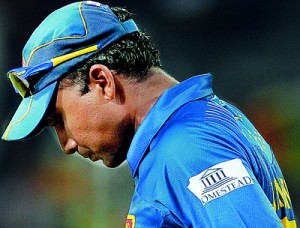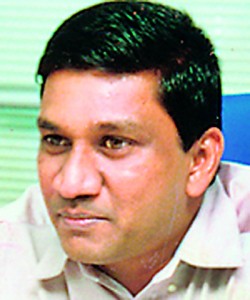Sri Lanka’s World Twenty20 heartbreak
I headed out to South Africa on Tuesday evening to take part in the Champions League, barely 48 hours after our bitterly disappointing loss on Sunday to the West Indies. The enormous disappointment runs across many fronts, chief among them being our inability to provide our fans with a unique chance to celebrate a World Cup win in their own backyard. We were so close but, ultimately, so far. For the West Indies, it was a great turnaround and a great moment for them, as demonstrated by their colourful celebrations, so congratulations must go out to them for playing the better cricket on the day.
With hindsight I feel we lost control of the game in the field. The pitch was difficult to bat on with the ball sticking on the surface and a par total was probably close to 120. Ultimately we should have kept them to below 100 after such a brilliant start, restricting them to around 48 after 12 overs. At that stage Marlon Samuels had to take a chance and I knew he had to take a chance. I opted to go with Lasith Malinga as I knew Samuels had struggled with him in Kandy, but this time Samuels played the knock of his life and completely changed the momentum of the game.

Dejected Mahela Jayawardena after the T20 finals
While their final total of 137 was outstanding in the backdrop of such a slow-scoring start, it was not an intimidating total and one we’d have settled for before the game had started. Ravi Rampaul’s first-up delivery against Dilshan was a huge blow. Thereafter, they bowled their spinners to take the pace off the ball, and we were unable to capitalise in the power-play overs which saw the required run-rate steadily rise. Perhaps with hindsight I should have been more aggressive and taken greater risks with the harder ball. With the threat of rain compounding the issue, the run-chase soon became harder and then wickets started to tumble like nine-pins. We simply did not handle the pressure as we should have and paid the price for it.
While the players hurt more than anyone else can ever imagine, it’s also vital for us to put such disappointments behind us as soon as possible. More than most, sportspeople cannot afford to dwell on missed opportunities and need to rapidly re-focus and re-group. A big part of that process is about taking the positives and, even from the worst of the worst defeats, there are always positives to be found.
While it can be argued that we snatched defeat from the jaws of victory in the final, especially given the position we had them in midway through their innings, I think there are plenty of positives that we derived from the tournament as a whole. Chief among them is the experience gained by the youngsters. Akila Dananjaya is still a month or so short of his 19th birthday, while the likes of Thisara Perera, Lahiru Thirimanne, Dilshan Munaweera and Dinesh Chandimal are still 23 years or less. Chandimal may not have played a game in this tournament, but he is obviously one of the key players of the future who has already notched up nearly 50 ODIs since making his debut a couple of years ago.
Add Angelo Mathews, who at 25 years has already experienced two Twenty20 World Cup finals, and who was an integral member of last year’s 50-over World Cup team despite missing out on the finals due to injury. Thisara, too, featured heavily in that 50-over tournament including in the final against India, so all this equates to a great wealth of experience by a group of players who are still in the relative infancy of their careers and who have many bright years ahead of them. This augurs very well for the future of Sri Lankan cricket and the experience, including that of playing in a final, is the most significant positive that we can take out of this tournament.
Put in perspective, playing a World Cup final is an experience that giants of the game such as Jacques Kallis and Daniel Vettori have never ever known and may never ever know as they approach the tail-end of their lengthy careers. Yet, but for his unfortunate injury in the 50-over World Cup semi-final last year, Angelo would have experienced three World Cup finals before his 26th birthday. Further, in the space of 18 months, Thisara, aged just 23 has already played in two World Cup finals. Put in perspective, power-hitting all-rounder Lance Klusener played his first international game aged 25.Getting back to the final, as I have said, we are of course very disappointed not to have won but there is another aspect that I also find disappointing. That is the level of criticism being directed towards Lasith. As players, we have to take responsibility for our performances and results, and following a loss or losses, the ensuing fallout from fans and the media is par for the course. We understand and accept that. What has been directed towards Lasith, however, is in my view way over the top and grossly unfair.
The first thing to take in to consideration is that in sport, even the greatest of the greats are going to experience massive failures, just as they will enjoy moments of unbridled brilliance. Again, keeping it in perspective, no batsman had ever struck Lasith for more than one six in a T20 match before, and nor had he ceded more than two sixes in an innings ever. Yet, on Sunday, one batsman alone defied history and struck Lasith for five sixes. It was Lasith’s biggest off-day, just as it was perhaps Samuels’ biggest day on. It happens. And when it does, I think it is rather poor when criticism revolves around playing the man and not the ball.
Few players in my time have generated more exhilarating, electrifying and memorable moments for Sri Lanka as has the mercurial and unique “Slinga” Malinga. Indeed, few players have captured the imagination of the cricket world as has Lasith, with his totally unique bowling style and of course, his distinctive appearance. Such a fine record and reputation does not get tarnished or summarily dismissed on the back of one, or even two or three bad performances.
Suggestions that Lasith now plays well only in the IPL are not only offensive for its intent, but is not a reasonable analogy anyway. International cricket is the toughest level of cricket by far, especially in tournaments such as the World Cup, and the challenges faced are always greater than what are posed in domestic competitions where up to a third or more of a team have never played international cricket. So it makes sense that performances are usually superior in competitions where the challenge is less, especially in terms of consistency.
Notwithstanding the disappointment of losing the finals, the end of World Cups have often signalled changes of the guard and a fresh start in preparation for the next World Cup. In that respect, I think it is an exciting time with so many youngsters having already put their hands up, and so many challenging for positions in the team. It is also time for me to step down as captain, which is a decision that I took in conjunction with the selectors several weeks prior to this tournament. The T20 format is a good format for a prospective captain to acclimatise himself in to the role so this is an ideal time to start planning for the future.
With permission for reproduction in the Sunday Times courtesy Anchorfan
Follow @timesonlinelk
comments powered by Disqus























